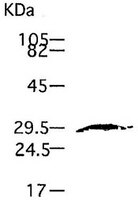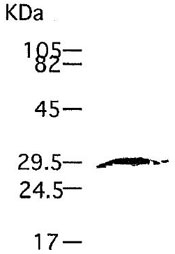IM40 Sigma-AldrichAnti-MMP-7 (Ab-1) Mouse mAb (141-7B2)
This Anti-MMP-7 (Ab-1) Mouse mAb (141-7B2) is validated for use in Immunoblotting, Paraffin Sections for the detection of MMP-7 (Ab-1).
More>> This Anti-MMP-7 (Ab-1) Mouse mAb (141-7B2) is validated for use in Immunoblotting, Paraffin Sections for the detection of MMP-7 (Ab-1). Less<<Synonyms: Anti-Matrilysin, Anti-Matrix Metalloproteinase 7, Anti-PUMP-1
Recommended Products
Overview
| Replacement Information |
|---|
Key Spec Table
| Species Reactivity | Host | Antibody Type |
|---|---|---|
| H | M | Monoclonal Antibody |
Products
| Catalogue Number | Packaging | Qty/Pack | |
|---|---|---|---|
| IM40-100UGCN | Plastic ampoule | 100 μg |
| Product Information | |
|---|---|
| Declaration | Manufactured by Daiichi Fine Chemical Co., Ltd. Not available for sale in Japan. |
| Form | Liquid |
| Formulation | In 100 mM sodium phosphate buffer, 0.1% BSA, pH 7.0. |
| Positive control | CaR-1 or TPA treated SW620 cells |
| Preservative | ≤0.1% sodium azide |
| Quality Level | MQ100 |
| Physicochemical Information |
|---|
| Dimensions |
|---|
| Materials Information |
|---|
| Toxicological Information |
|---|
| Safety Information according to GHS |
|---|
| Safety Information |
|---|
| Product Usage Statements |
|---|
| Packaging Information |
|---|
| Transport Information |
|---|
| Supplemental Information |
|---|
| Specifications |
|---|
| Global Trade Item Number | |
|---|---|
| Catalogue Number | GTIN |
| IM40-100UGCN | 04055977220599 |
Documentation
Anti-MMP-7 (Ab-1) Mouse mAb (141-7B2) SDS
| Title |
|---|
Anti-MMP-7 (Ab-1) Mouse mAb (141-7B2) Certificates of Analysis
| Title | Lot Number |
|---|---|
| IM40 |
References
| Reference overview |
|---|
| Brunner, K.L, et al. 1995. Proc. Natl. Acad. Sci. USA 92, 7362. Imai, K., et al. 1995. J. Biol. Chem. 270, 6691. Lichtinghagen, R., et al. 1995. Eur. J. Clin. Chem. Clin. Biochem. 33, 65. Nakano, A., et al. 1995. J. Neurosurg. 83, 298. Takino, T., et al. 1995. J. Biol. Chem. 270, 23013. Woessner, J.F. 1991. FASEB J. 5, 2145. Yamamoto, H., et al. 1995. J. Clin. Lab. Anal. 9, 297. Gaire, M., et al. 1994. J. Biol. Chem. 269, 2032. McDonnell, S., et al. 1994. Biochem. Soc. Trans. 22, 58. Cottam, D.W. and Rees, R.C. 1993. Intl J. Oncol. 2, 861. Stetler-Stevenson, W.G., et al. 1993. FASEB J. 7, 1434. Woessner, J.F. 1991. FASEB J. 5, 2145. Liotta, L.A. and Stetler-Stevenson, W.G. 1990. in Sem. Cancer Biol., ed. M. M. Gottesman. Vol. 1(2), 99. Woessner, J.F., Jr and Taplin, C.J. 1988. J. Biol. Chem. 263, 16918. Sellers, A. and Woessner, J.F., Jr. 1980. Biochem. J. 189, 521. |








